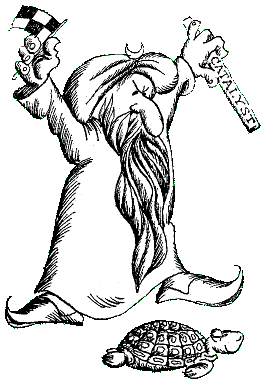107Stories About ChemistryINDEX |
48.
How to Make a Tortoise Go
Like �Lightning� and Vice Versa A hundred odd years ago a chemist carefully introduced a platinum wire into a vessel containing a mixture of hydrogen and oxygen. The result was extraordinary. The container filled up with fog, that is, with water vapour. The temperature remained unchanged and so did the pressure, but the reaction between hydrogen and oxygen, �calculated� to take thousands of years, occurred in a matter of seconds. Nor was this all. The platinum wire which had caused the two gases to combine instantly, had undergone absolutely no change. Its appearance, chemical composition, and weight, were exactly the same after the experiment as before it. Now the scientist was by no means a magician, one of those who invents all kinds of clever tricks to amuse a curious public. This was a serious investigator, the German chemist Dobereiner.  The phenomenon he observed is now called catalysis. Substances capable of �making tortoises go like lightning� are called catalysts. Catalysts are literally legion. They may be metals, solid or powdered, oxides of a great variety of elements, salts, or bases. They may be used in the pure form or as mixtures. Without a catalyst the efficiency of ammonia synthesis is very low, no matter how we vary the pressure and temperature. But the presence of a catalyst makes things entirely different. Ordinary metallic iron with an admixture of aluminium and potassium oxides accelerates the reaction considerably. Twentieth-century chemistry owes its unprecedented progress to the use of catalysts. Nor is this all. Various vital processes occur in animal and plant organisms owing to the presence of special catalysts called enzymes. The chemistry of all animate and inanimate nature, such is the range of these wonderful accelerators! But what if we take a copper, aluminium or iron wire instead of a platinum one? Will the vessel walls again become foggy? Alas! Hydrogen and oxygen display no inclination to react as they did when urged on by the magic platinum wand... Not every substance can accelerate any particular process. Therefore chemists say that catalysts are selective in their action: they may influence one reaction vigorously without paying attention at all to another. Of course, there are exceptions to this rule. For example, aluminium oxide is capable of catalyzing several dozen different synthesis reactions of both organic and inorganic compounds. Finally, different catalysts may make a mixture of the same substances react differently to form different products. There are substances with no less surprising properties, called promoters. Taken by themselves, they do not influence the course of the reaction, neither accelerating nor decelerating it. If added to a catalyst, promoters accelerate the reaction to a much greater degree than the catalyst itself. A platinum wire with �impurities� of iron, aluminium, or silicon dioxide, would cause a still more impressive effect in a mixture of hydrogen and oxygen. There is also another kind of catalysis, inside out catalysis. There are anticatalysis and anticatalysts. Scientists called them inhibitors. Their purpose is to slow down rapid chemical reactions. |





